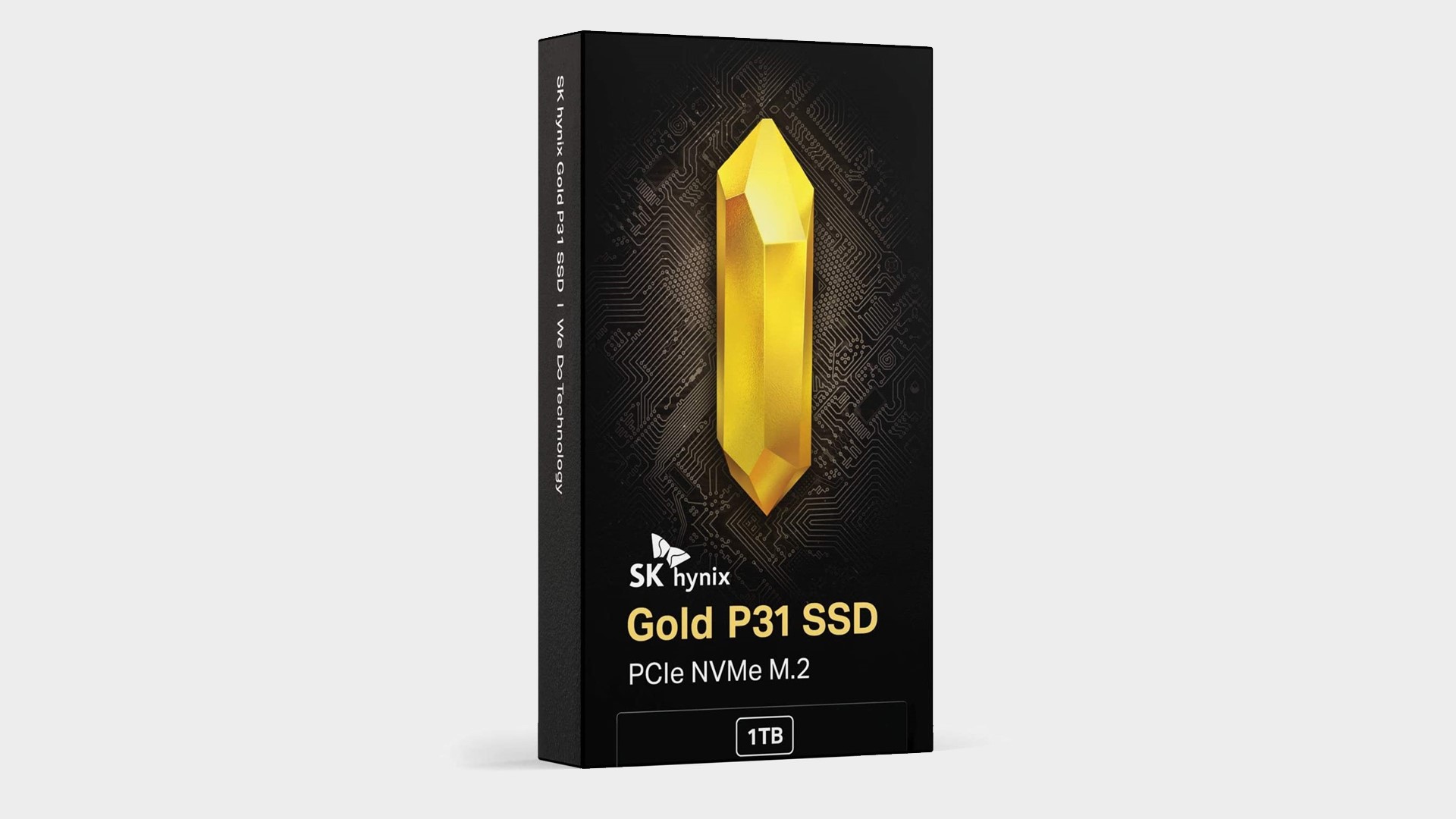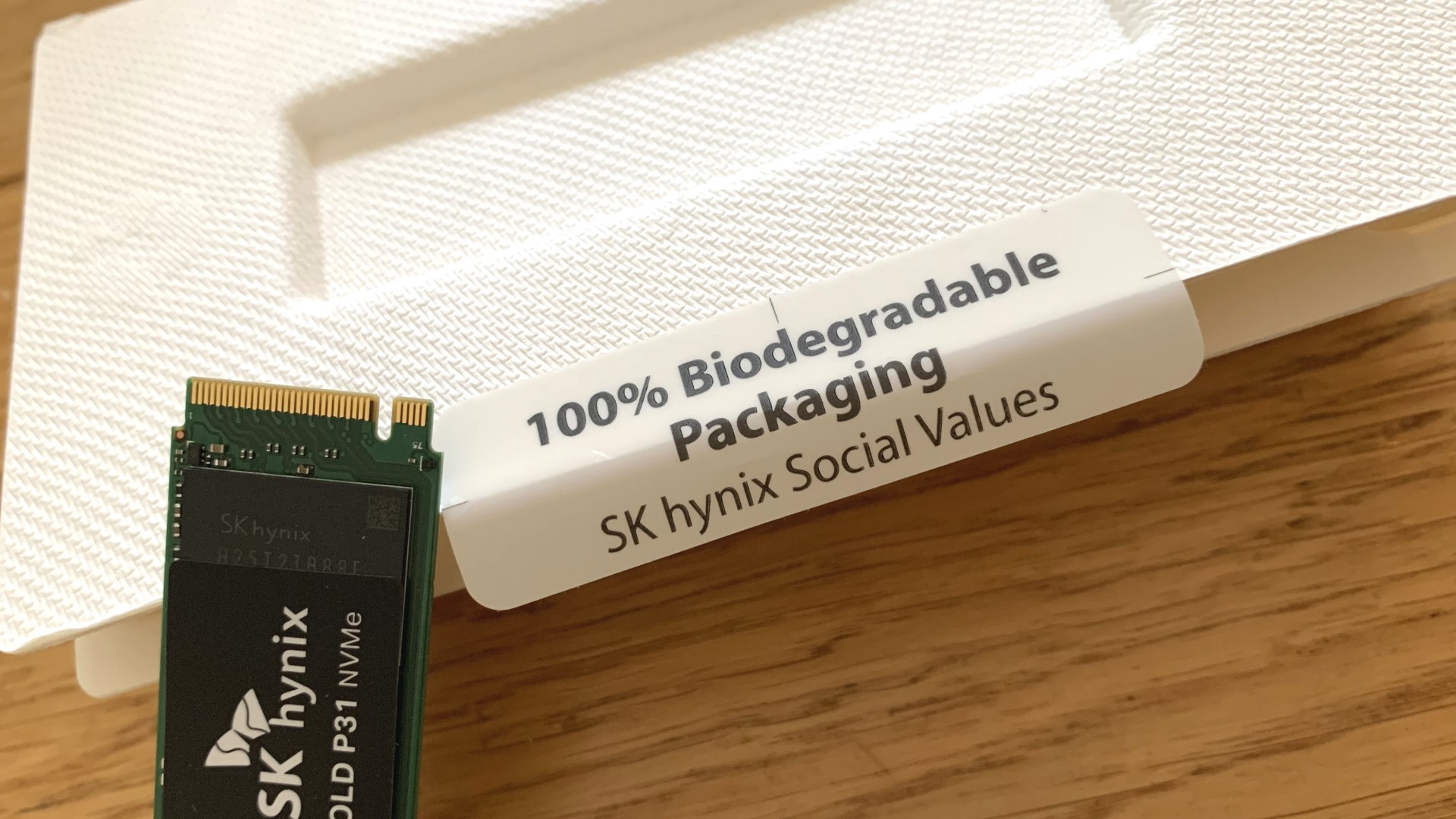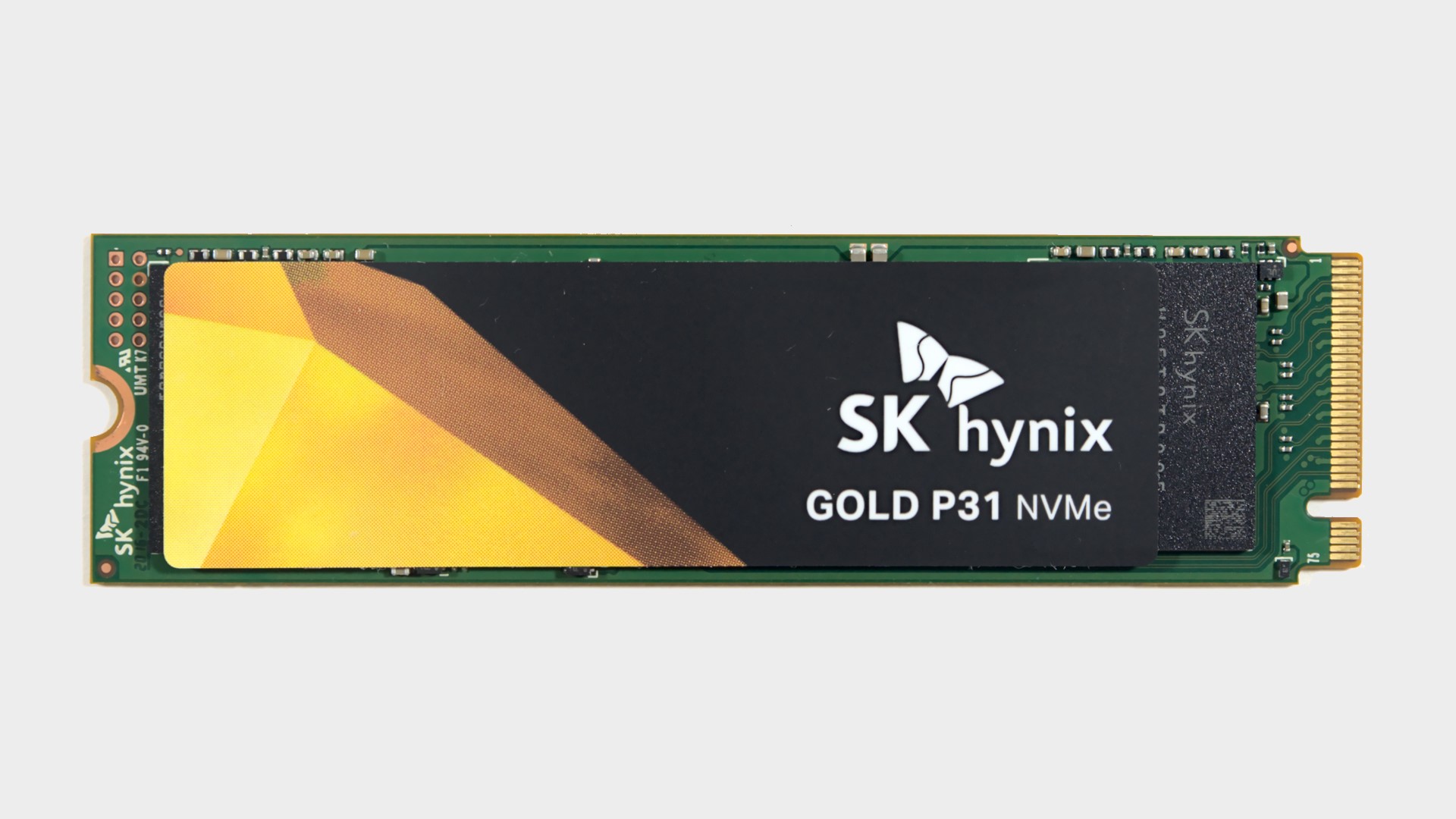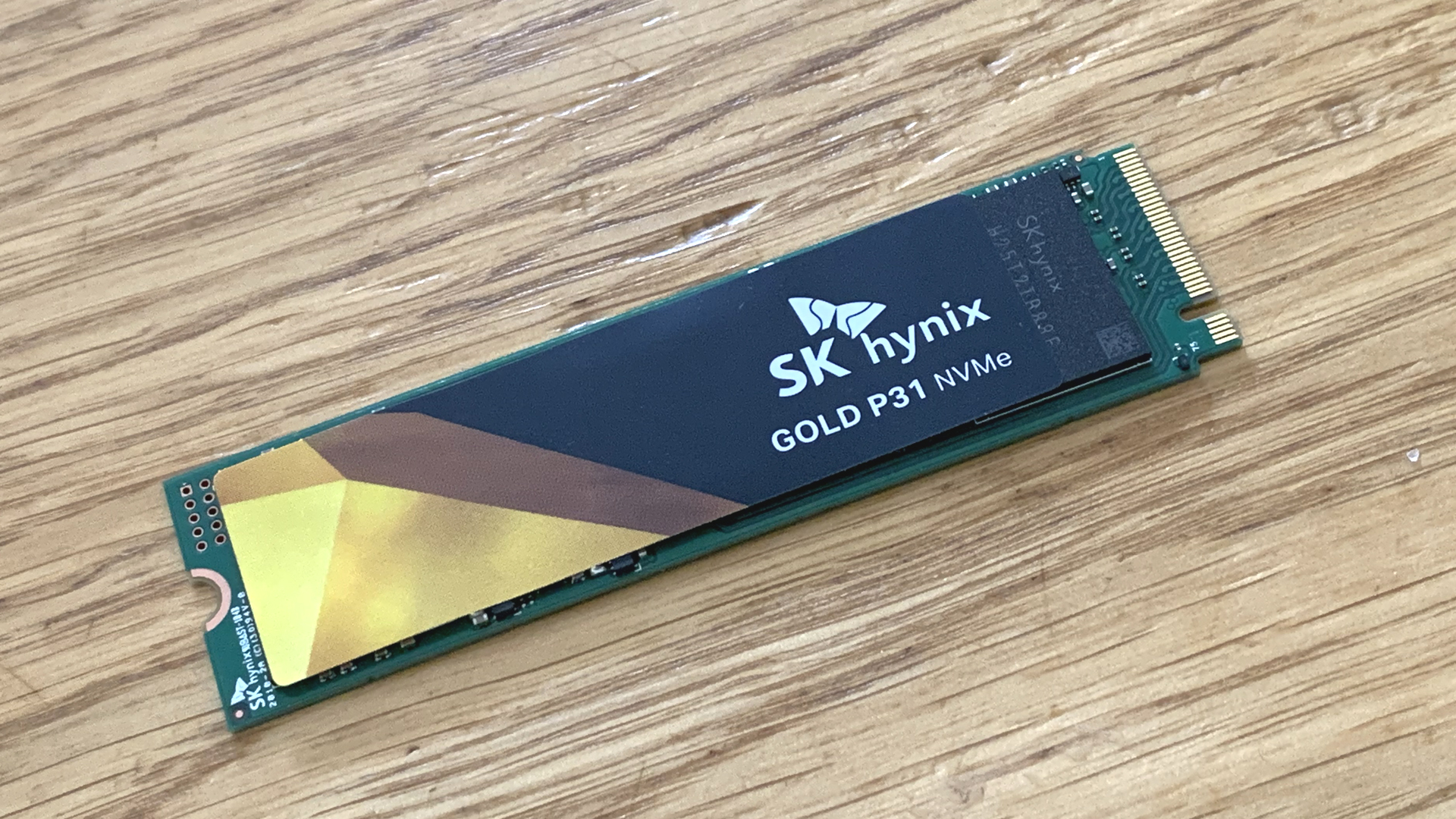GamesRadar+ Verdict
A great value PCIe 3.0 SSD based on TLC rather than cheaper QLC memory.
Pros
- +
Good all-round performance
- +
A proper TLC rather than QLC drive
- +
Five-year warranty
Cons
- -
‘Only’ a PCIe 3.0 drive
- -
Slightly patchy 4K performance
- -
Lack of AES 256-bit encryption if you’re being picky
Why you can trust GamesRadar+
The new SK Hynix Gold P31, reviewed here in 1TB spec, bucks the trend by not conforming to the latest, fastest, and funkiest solid-state drives that use quad-lane PCI Express 4.0 connections - all 8GB/s of them. This is an M.2 SSD that sticks with the older PCIe 3.0 interface, which is precisely half as fast. In other words, this is a more mainstream, affordable contender for best SSD for gaming. And that might be just what you need.
Thing is, raw storage bandwidth isn’t always a major limitation to performance. Not if the context is the best gaming PC or the best gaming laptop. For sure, you want plenty of bandwidth, but diminishing returns do kick in. While this drive isn’t up there with the very fastest in terms of peak throughput, that doesn’t necessarily impact real-world performance including game level load times.
So, it’s arguably other metrics that decide just how compelling an SSD is. Like value, features, reliability, and some of the finer details of performance, including random access. The latter can have a much bigger impact on how responsive your PC feels than the big, fat sequential read and write numbers.
Design & Features
With that in mind, the numbers bode pretty well for the SK Hynix Gold P31. For starters, it uses TLC rather than QLC flash memory. That means it can store three bits of data per memory cell rather than four. That’s an obvious density disadvantage, but it’s also a clear performance win as QLC memory is far slower than TLC.
Of course, SLC or single-bit memory is even faster, which is why the SK Hynix Gold P31 has around 90GB of its TLC memory allocated dynamically in SLC mode (in practice that requires three times that much actual TLC capacity). It’s a feature commonly offered by modern SSDs and it improves immediate performance under extreme load, after which data can be re-allocated into TLC cells in the background while the drive is idling.

The other notable spec point is the quad-lane PCIe 3.0 rather than 4.0 interface. That obviously limits performance but it’s also somewhat academic if your PC doesn’t support PCIe 4.0, something true of all Intel-based systems prior to the introduction of the latest Rocket Lake chips.
As for how this actually translates into performance, SK Hynix says the Gold P31 is good for peak reads and writes of 3,500MB/s and 3,200MB/s respectively. However, those figures are for SLC mode; the underlying write speed of the TLC memory is actually 1,700MB/s. There’s a similar split for claimed random access performance, with 570K read IOPS and 600K write IOPS in SLC mode, while the base performance of the TLC cells is rated at 500K read and 370K write IOPS.
Backing this up is 1GB of DRR4 DRAM cache and it’s all marshalled by SK Hynix’s own Cepheus controller chip. All told, the Gold P31 1TB is said to be good for 750TB of write endurance, which is very good and reflects the superior endurance of TLC memory compared to cheaper QLC chips.
One arguable weak area is a lack of hardware encryption. Granted, data can still be encrypted using software tools, but at the cost of CPU load. If you want all your data encrypted all the time, that’s a serious problem. But unless your gaming PC also doubles as, well, a server system in a bank or other business, that’s unlikely to be an issue. You can simply encrypt selectively.
For the record, the SK Hynix Gold P31 1TB comes in fully biodegradable packaging, which is an unusual detail in this class of device. That attention paid to sustainability may also explain the slightly ugly green PCB board on which the board is based. That has no relevance for short-term performance, though degradable materials may raise long-term reliability concerns. Conspicuously, the SK Hynix Gold P31 also lacks any kind of cooling or a heat spreader. That said, this drive comes with a full five-year warranty for peace of mind, too.

Finally, at fully 1TB this drive is big enough for a moderately generous games library. Certainly, it’s large enough to have all your favourites and regulars available via speedy solid-state storage, relegating occasional flings to mass storage on that clunky old magnetic secondary drive.
Performance
The SK Hynix Gold P31 1TB’s key performance metrics are mostly what you’d expect for this class of drive. Peak bandwidth is around 3.5GB/s for both reads and writes, which is plenty.
The story around random access performance is a little more complicated. In the first few runs, 4K QD1 performance is 74MB/s. But that drops into the mid-50s, hence the relatively poor scaling as the queue depth increases. The numbers aren’t bad per se, it’s just a small blot on a broadly positive performance copybook.
As for game level load performance, well, SSD performance only has a limited impact on that. The likes of, say, a Samsung 980 Pro offers twice the peak bandwidth of this drive. But when it comes to game level loads it’s nine and a bit seconds versus 11 and a bit seconds in the Final Fantasy XIV: Shadowbringers benchmark, which handily records level load times. In truth, much of the bottleneck when it comes to game load times is due to the PC platform, not SSD performance. That may change when Microsoft's Direct Storage technology comes to the PC with Windows 11 later this year.

But what of that 90GB SLC cache, what impact does that have? Sure enough, after around 90GB/s of sustained data transfer when copying large video files internally, drive performance does drop off. But it’s not a huge fall. Initial internal file copy performance is 1.2GB/s, which then drops to 900MB/s for a further 200GB. The drive then sustains around 750MB/s to 900MB/s until completely full, which should be fine for all but the most demanding users.
Overall - should you buy it?
If you’re in the market for a good value 1TB M.2 SSD with decent all-round performance, then the answer has to be affirmative. The SK Hynix Gold P31 doesn’t set any performance records. It might not reach the ridiculous speeds and performance of the likes of the WD AN1500 and WD SN850, for example, but it’s a solid real-world performer, comes with a five-year warranty, and is very likely all the SSD you actually need.
A serious dissertation on the finer points of input lag and overshoot followed by a forensic examination of AI-accelerated temporal upscaling. Such is a routine day in the working life of long-time tech wordsmith, Jeremy Laird. Along with GamesRadar, Jeremy’s 15-year back catalogue includes a host of tech and gaming outlets, including TechRadar and PC Gamer, not to mention contributions to mainstream media from the Independent to the Evening Standard. Complimenting Jeremy’s debilitating addiction to all kinds of digital hardware, he is also afflicted by an obsession with and a significant occupational sideline in cars and automotive technology.





